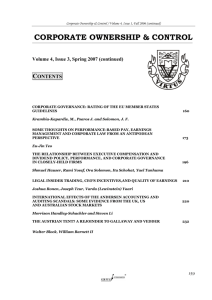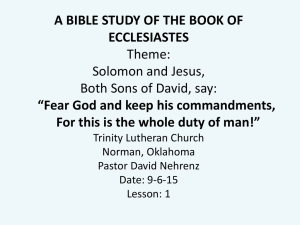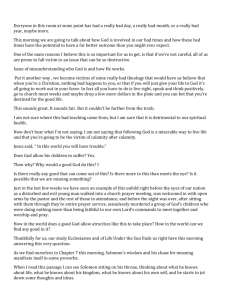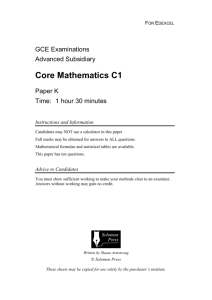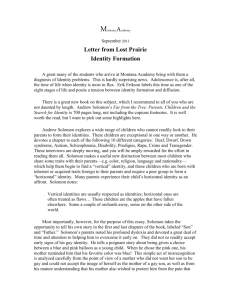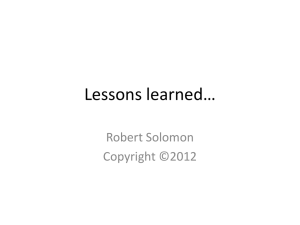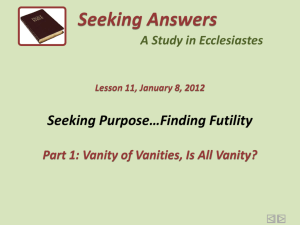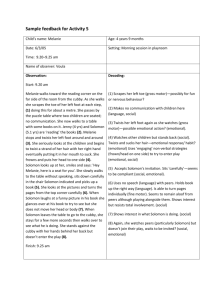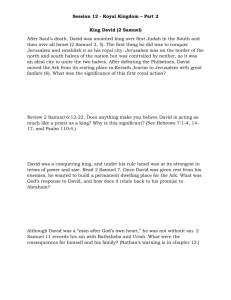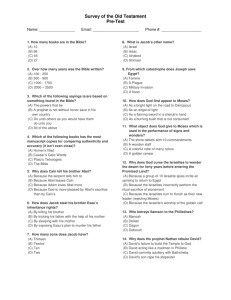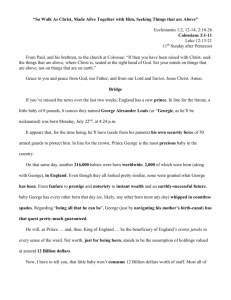Ecclesiastes14_103005 - Little Zion Primitive Baptist Church
advertisement
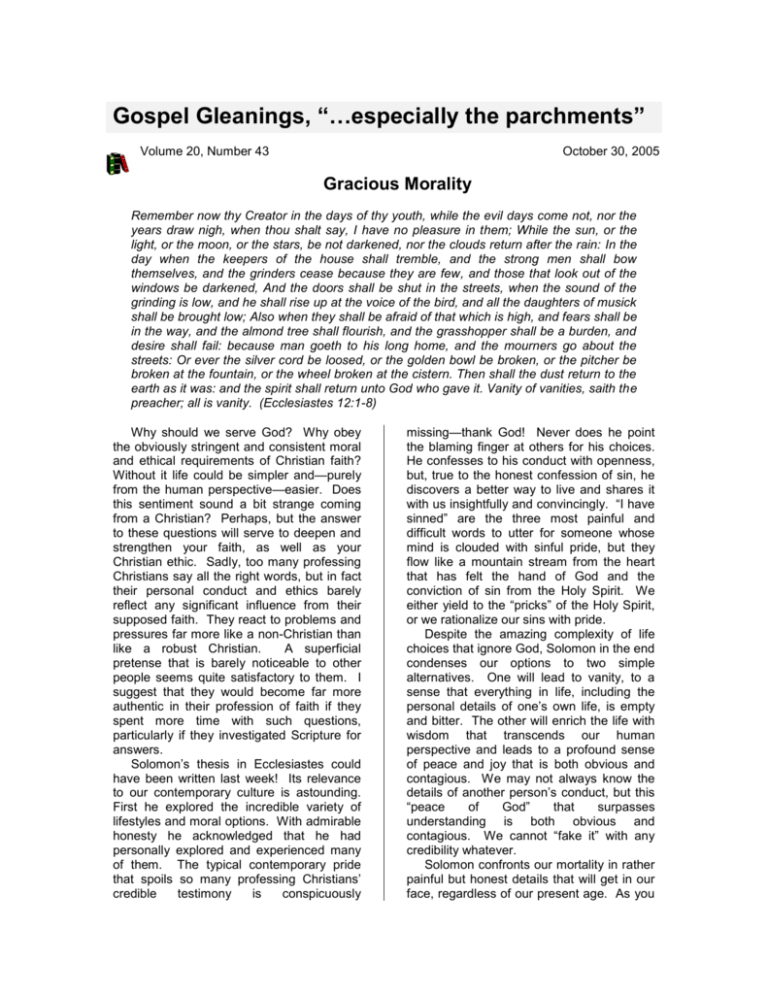
Gospel Gleanings, “…especially the parchments” Volume 20, Number 43 October 30, 2005 Gracious Morality Remember now thy Creator in the days of thy youth, while the evil days come not, nor the years draw nigh, when thou shalt say, I have no pleasure in them; While the sun, or the light, or the moon, or the stars, be not darkened, nor the clouds return after the rain: In the day when the keepers of the house shall tremble, and the strong men shall bow themselves, and the grinders cease because they are few, and those that look out of the windows be darkened, And the doors shall be shut in the streets, when the sound of the grinding is low, and he shall rise up at the voice of the bird, and all the daughters of musick shall be brought low; Also when they shall be afraid of that which is high, and fears shall be in the way, and the almond tree shall flourish, and the grasshopper shall be a burden, and desire shall fail: because man goeth to his long home, and the mourners go about the streets: Or ever the silver cord be loosed, or the golden bowl be broken, or the pitcher be broken at the fountain, or the wheel broken at the cistern. Then shall the dust return to the earth as it was: and the spirit shall return unto God who gave it. Vanity of vanities, saith the preacher; all is vanity. (Ecclesiastes 12:1-8) Why should we serve God? Why obey the obviously stringent and consistent moral and ethical requirements of Christian faith? Without it life could be simpler and—purely from the human perspective—easier. Does this sentiment sound a bit strange coming from a Christian? Perhaps, but the answer to these questions will serve to deepen and strengthen your faith, as well as your Christian ethic. Sadly, too many professing Christians say all the right words, but in fact their personal conduct and ethics barely reflect any significant influence from their supposed faith. They react to problems and pressures far more like a non-Christian than like a robust Christian. A superficial pretense that is barely noticeable to other people seems quite satisfactory to them. I suggest that they would become far more authentic in their profession of faith if they spent more time with such questions, particularly if they investigated Scripture for answers. Solomon’s thesis in Ecclesiastes could have been written last week! Its relevance to our contemporary culture is astounding. First he explored the incredible variety of lifestyles and moral options. With admirable honesty he acknowledged that he had personally explored and experienced many of them. The typical contemporary pride that spoils so many professing Christians’ credible testimony is conspicuously missing—thank God! Never does he point the blaming finger at others for his choices. He confesses to his conduct with openness, but, true to the honest confession of sin, he discovers a better way to live and shares it with us insightfully and convincingly. “I have sinned” are the three most painful and difficult words to utter for someone whose mind is clouded with sinful pride, but they flow like a mountain stream from the heart that has felt the hand of God and the conviction of sin from the Holy Spirit. We either yield to the “pricks” of the Holy Spirit, or we rationalize our sins with pride. Despite the amazing complexity of life choices that ignore God, Solomon in the end condenses our options to two simple alternatives. One will lead to vanity, to a sense that everything in life, including the personal details of one’s own life, is empty and bitter. The other will enrich the life with wisdom that transcends our human perspective and leads to a profound sense of peace and joy that is both obvious and contagious. We may not always know the details of another person’s conduct, but this “peace of God” that surpasses understanding is both obvious and contagious. We cannot “fake it” with any credibility whatever. Solomon confronts our mortality in rather painful but honest details that will get in our face, regardless of our present age. As you read through the roadmap that age imprints on your physical body, not to mention your mind, take the time to look in the mirror. Solomon shows us the vivid reality of our two ultimate choices in “living color.” We can focus our life and emphasis on the visible, but in the end the most personal and visible thing in our life, our own body, will reveal the frailty of the visible and the selfcentric lifestyle. Solomon’s description of the alternative is simple and refreshing, “Remember now thy Creator in the days of thy youth.” A time will come when a person who has lived with too much emphasis on the material will be forced to look in the mirror, face personal mortality, and say, “I’m useless. There is no purpose left for my continued living.” Interestingly the word translated “pleasure” in this passage is the same word that is translated “purpose” in Ecclesiastes 3:1. Consider the impact of age on our body as outlined by Solomon in these verses. Given this glaring reality, why would anyone who truly believes in God want to choose the material over the spiritual? 1. The “keepers of the house,” the hands, develop tremors. 2. The “strong men,” the legs, bow themselves, are bent with arthritis. 3. The “grinders” cease because they are few. The teeth either lose their ability to chew, or they fall out—you have few of them left. 4. Those that “look out of the windows” are darkened; eyesight fades. Cataracts and other vision problems leave the impression that everything is too dark to see clearly. “I need more light.” 5. The “doors” are shut; the mouth can’t function as it once did, either in speaking or eating. You can’t remember the names and details of people and past events or knowledge. 6. The “sound of grinding” is low. You can no longer eat hard food; you are confined to soft food. 7. You “rise up at the sound of a bird;” you sleep lightly and are awakened at the slightest noise. 8. All the “daughters of music” are low. You lose your hearing; you can’t hear all the nuances of music clearly as you once could. 9. You are afraid of “that which is high.” You develop a fear of falling or of “the way,” of stumbling and falling when you walk. 10. The “almond tree flourishes.” When an almond tree blooms, it is covered with white blossoms; your hair turns white with age. 11. The “grasshopper” becomes a burden. A crippled grasshopper drags itself along—can no longer leap and fly. You are crippled with age-related arthritis or other similar diseases. 12. “Desire shall fail.” You’d like to do a lot of things that you can’t do; your body no longer cooperates. 13. “Man goes to his long home”—he dies— and those who mourn his death remain. 14. The “silver cord” is loosed. The spinal cord that connects the brain to the whole body, perhaps the whole central nervous system, breaks down. 15. The “golden bowl” is broken; the brain, the control center of the central nervous system, degenerates and fails. 16. The “pitcher” is broken at the fountain. The heart that gathers and circulates the blood breaks down. 17. The “wheel is broken at the cistern.” The circulatory system that moves blood through the body breaks down and no longer functions as it should. 18. Death occurs. The physical body returns to the dust as it was (Genesis 2:7). The spirit, the immaterial part of man, returns to God who gave it. While Solomon forces us to look face-toface and personal at our own mortality, Paul will teach us the same lesson in the New Testament, “Therefore, my beloved brethren, be ye stedfast, unmoveable, always abounding in the work of the Lord, forasmuch as ye know that your labour is not in vain in the Lord.” (1 Corinthians 15:58) Solomon introduces the final day following these verses; Paul teaches the resurrection prior to his conclusion, but both men lead us to look beyond our mortality and to live life with the constant realization of God and His way to live. “The just shall live by his faith” is the Biblical conclusion that leads us above the sun and into a full and joyful live rather than the life of futility and vanity. May we study Solomon intensely and learn his lesson well. Little Zion Primitive Baptist Church 16434 Woodruff Bellflower, California Worship service each Sunday Joseph R. Holder 10:30 A. M. Pastor
